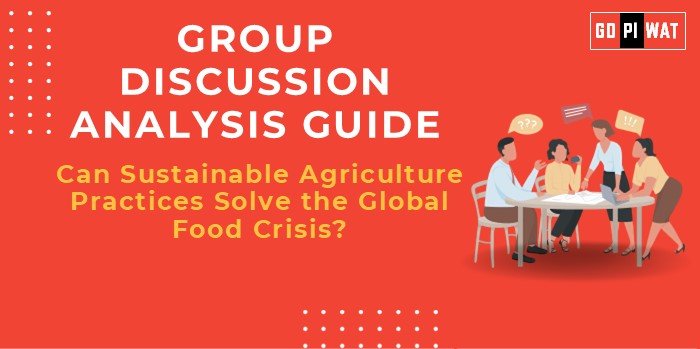📋 Group Discussion Analysis Guide: Can Sustainable Agriculture Practices Solve the Global Food Crisis?
🌍 Introduction to the Topic
Opening Context:
The global food crisis, exacerbated by climate change, population growth, and resource scarcity, demands innovative solutions. Sustainable agriculture practices emerge as a potential game-changer in addressing these challenges.
Topic Background:
Sustainable agriculture refers to farming methods that preserve resources, reduce environmental impact, and ensure long-term food security. It has gained prominence as a response to declining arable land, water shortages, and biodiversity loss, highlighted by international initiatives such as the UN’s Sustainable Development Goals (SDG 2: Zero Hunger).
📊 Quick Facts and Key Statistics
- 🌍 Hunger Impact: Over 828 million people globally faced hunger in 2022 (FAO).
- 🍽️ Food Waste: 1.3 billion tons of food wasted annually, a stark contrast to hunger statistics (UNEP).
- 🌡️ Carbon Footprint: Agriculture contributes to 19-29% of global greenhouse gas emissions (FAO).
- 💧 Water Use: Agriculture accounts for 70% of global freshwater consumption (WWF).
👥 Stakeholders and Their Roles
- Governments: Policy creation, subsidies for sustainable practices, and research funding.
- Farmers: Adoption of eco-friendly farming techniques and innovation in crop management.
- Private Sector: Investment in agri-tech and sustainable supply chains.
- International Organizations: Advocacy and funding for global food security projects.
✨ Achievements and Challenges
🌟 Achievements:
- Soil Conservation: Conservation tillage has increased crop yields by 10-20% in regions adopting sustainable practices.
- Agri-Tech Innovations: Vertical farming and precision agriculture reduce resource usage while boosting efficiency.
- Organic Farming Success: Countries like Denmark allocate 11% of their farmland to organic farming, reducing chemical reliance.
⚠️ Challenges:
- Cost Barriers: High initial investment deters small-scale farmers.
- Knowledge Gap: Limited access to information on sustainable practices.
- Climate Risks: Unpredictable weather undermines agricultural stability.
🌍 Global Comparisons and Case Studies
- Netherlands: Leader in greenhouse agriculture, producing high yields on limited land.
- Rwanda: Integrated land management policies have boosted agricultural productivity by 6%.
- India’s Sikkim: Achieved 100% organic farming status in 2016, significantly reducing chemical use and enhancing soil health.
💬 Structured Arguments for Discussion
- Supporting Stance: “Sustainable agriculture can reduce resource dependency, enhance food security, and combat climate change.”
- Opposing Stance: “The transition to sustainable practices is economically unfeasible for smallholder farmers without substantial support.”
- Balanced Perspective: “Sustainable agriculture holds immense promise but requires coordinated efforts in policy, technology, and education for global implementation.”
🔑 Effective Discussion Approaches
- Opening Approaches:
- “By 2050, feeding 10 billion people will require a 50% increase in agricultural production. Can sustainable practices meet this demand?”
- “Sikkim’s organic farming success story provides a blueprint, but can it scale globally?”
- Counter-Argument Handling:
- Challenge: “Sustainable practices are too costly.”
- Rebuttal: “Government subsidies and technology like precision farming are reducing costs significantly.”
📈 Strategic Analysis: SWOT
- Strengths: Reduces environmental impact; enhances biodiversity.
- Weaknesses: High initial investment; knowledge gaps among farmers.
- Opportunities: Growing global demand for sustainable products; advancements in agri-tech.
- Threats: Resistance from traditional agricultural sectors; impact of extreme weather events.
🎓 Connecting with B-School Applications
- Real-World Applications: Case studies in sustainability management; projects in rural development and agri-tech.
- Sample Interview Questions:
- “How can sustainable agriculture drive economic growth in rural areas?”
- “What role can technology play in overcoming the challenges of sustainable farming?”
- Insights for B-School Students:
- Understand the intersection of sustainability and global supply chains.
- Explore innovations like blockchain for transparent agricultural practices.


